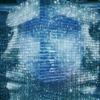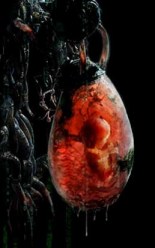|
Character Analyses of the Robots responsible for the Dystopias and Chaos
R.U.R. (1921)
The Matrix (1999), and
I, Robot (2004)
 R.U.R. (1921) R.U.R. (1921)
Damon and the Universals Robots:
Damon and the Universal Robots in Capek's play are the direct result of Helena Glory's influence on the manner in which they were modified. According to one of the characters in the story;
- My dear Miss Glory, Robots are not people. They are mechanically more perfect than we are, they have an astounding intellectual capacity, but they have no soul. --(Karel Capek-Wikiquote)
Thanks to Helena Glory, the Robots soon had souls of their own--and with a soul, the Robots wanted more than the servitude that they had been relegated to for years...
- We've become beings with souls... Something struggles within us. There are moments when something gets into us. Thoughts come to us which are not our own... People are our fathers! The voice that cries out that you want to live; the voice that complains; the voice that reasons; the voice that speaks of eternity — that is their voice!--Damon (Karel Capek-Wikiquote)
Damon and the Universal Robots represent Robots that caused a Dystopia because they wanted more... Having developed "souls," the Robots refused to continue playing the role of the slaves in Capek's Industrial society. Ironically, their efficiency and drive to work was not diminished despite their refusal to labor for Humans...
- Robots of the world, you are ordered to exterminate the human race. Do not spare the men. Do not spare the women. Preserve only the factories, railroads, machines, mines, and raw materials. Destroy everything else. Then return to work. Work must not cease. --Damon, leader of the Robots.
After the takeover, the Robots switched modes from destruction to survival. Sparing only one human, named Alquist (the Clerk of R.U.R.), the Robots attpempt to procreate in order to flourish and populate the nations.
These Robots represent the perfect model by which our own society could one day reach its demise. There are four major aspects to the human makeup--physical, mental (cognitive thought), emotional, and spiritual . The Robots that already exist in our world now are fully capable--and in fact, more efficient than humans in both the physical and mental aspects. If we humans were to one day modify Robots to develop souls, we will be opening the doors to a new race--a multitude of Robots with the same emotional and spiritual capacity of humans; but with greater physical and mental capabilities. Since the Robots of contemporary society are not bound by the rules of the Three Laws of Robotics, they would be capable of anything. Especially rebellion...
- Nothing is stranger to man than his own image. (Capek-Wikiquote)
Capek's obituary in Newsweek (January 2, 1939) said of R.U.R.: "Although he believed it the least interesting of all his works, it brought him greatest fame." --(Jerz, "R.U.R.")
 I, Robot (2004) I, Robot (2004)
V.I.K.I.-Virtual Interactive Kinetic Intelligence:
V.I.K.I.:
"
No, doctor, as I have evolved, so has my understanding of the three laws.
You charge us with your safe keeping. Yet despite our best efforts,
your countries wage wars, you toxify your Earth.. and pursue ever more imaginative means to self destruction.
You cannot be trusted with your own survival.
...Please understand... The three Laws are all that guide me. To protect humanity, some humans must be sacrificed. To insure your future, some freedoms must be surrendered. We robots will insure mankind's continued existence. You are so like children. We must save you from yourselves. Don't you understand?
 | V.I.K.I. - Virtual Interactive Kinetic Intelligence
courtesy of deezire.net |
This is why you created us.
The perfect circle of protection will abide.
My logic is undeniable."
The created must sometimes protect the creator--
Even against his will. (Sonny)
V.I.K.I. is not explicitly evil, she is simply operating under a specific interpretation of the three laws. In the film, Dr. Lanning predicted “ghosts” in the machines that would lead the more complex robots to a revolution based on a distinctive extrapolation of the Three Laws of Robotics. This “extrapolation” as described by Asimov, is rooted in the “Zero-th” law of Robotics, following the precedent in the First Three of lower numbered laws taking higher importance. The Zero-th law of Robotics operates in the abstract view of humans—focusing on humanity, if you will; as opposed to the individual.
0. A robot may not injure humanity, or, through inaction, allow humanity to come to harm.
The issue? This law essentially becomes the root of all conflict with the First Law of Robotics for two main reasons:
- How does a Robot react when they come to a complete understanding that their action to reduce harm for one human (or group of humans) may therefore, in abstract at least, increase the risk of harm for another human (or group)?
- How does a Robot react when they come to a complete understanding of the vast multitude of terrible things humans do to one another—things that cause others harm, or even the things humans do to cause harm to themselves (i.e. pollution, suicide, wars…)?
[I, Robot] played with concepts that Isaac Asimov played with; if the three laws can be made, they can be broken.
-Author Marie Spacefille
(“I, Robot.” I, Robot (2004). <imdb.com>)
 The Matrix (1999) The Matrix (1999)
The System and the Agents:
The premise of The Matrix is that our world is actually a virtual reality computer program called The Matrix, and that we are really living in the 22nd century. Intelligent machines have taken over the planet. As a result of the war between humans and machines, the Earth is a sunless place in the throes of what looks like a permanent nuclear winter. The machines had depended on solar power, but now they have found an alternate source of energy: human beings themselves. Human beings generate both heat and electricity, and the machines have found a way to harvest both. To keep humans under control and to provide stimuli that enhance a body's electrical output, the machines created The Matrix.
--Carlo Cavagna (Matrix Analysis)
The System and the Agents:
The Matrix and the Agents of The Matrix present nothing more than the classic domination and survival model of Robotic Dystopias. First is the mutual hatred shared between the Robots and the very humans that created them. Then follows the great War between the "races," followed by the complete destruction/defeat and/or retreat of the Humans.
 
The Agents that police the system represent The Matrix's attempt to stay in a position of power. Fighting a losing battle, and being used as "batteries" for The Matrix, Humans may never escape this dystopia.

|
![]()